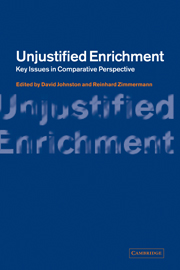Book contents
- Frontmatter
- Contents
- List of contributors
- Preface
- Table of cases
- List of abbreviations
- I Introduction
- II Enrichment ‘without legal ground’ or unjust factor approach
- III Failure of consideration
- IV Duress and fraud
- V Change of position
- 8 Restitution without enrichment? Change of position and Wegfall der Bereicherung
- 9 Unwinding mutual contracts: restitutio in integrum v. the defence of change of position
- VI Illegality
- VII Encroachment and restitution for wrongs
- VIII Improvements
- IX Discharge of another person's debt
- X Third-party enrichment
- XI Proprietary issues
- XII Taxonomy
- Index
8 - Restitution without enrichment? Change of position and Wegfall der Bereicherung
Published online by Cambridge University Press: 31 July 2009
- Frontmatter
- Contents
- List of contributors
- Preface
- Table of cases
- List of abbreviations
- I Introduction
- II Enrichment ‘without legal ground’ or unjust factor approach
- III Failure of consideration
- IV Duress and fraud
- V Change of position
- 8 Restitution without enrichment? Change of position and Wegfall der Bereicherung
- 9 Unwinding mutual contracts: restitutio in integrum v. the defence of change of position
- VI Illegality
- VII Encroachment and restitution for wrongs
- VIII Improvements
- IX Discharge of another person's debt
- X Third-party enrichment
- XI Proprietary issues
- XII Taxonomy
- Index
Summary
Introduction
In German law, American law and, more recently, English law, it is a defence to an action for unjust enrichment that the defendant is no longer enriched. Nevertheless, many German scholars want to limit this defence. My former teacher, John Dawson, thought it leads to senseless results in Germany, which American courts avoid only by refusing to apply it. In the United States, he said, ‘we would not as in Germany, conceive of enrichment as a variable that can be recovered only as long as it lasts’.
I do not like to quarrel with Dawson. I spent my early professional life believing he was infallible. This once, however, he may have been mistaken. At any rate, I do not think this defence leads to senseless results as long as it is confined to its original scope, using it to resolve the problems it was originally meant to resolve.
The original scope of the doctrine
These problems become clear if the origin of the doctrine is examined. The drafters of the German Civil Code took the doctrine from the nineteenth-century pandectists, Windscheid and Savigny. Savigny seems to have taken it from members of the seventeenth- and eighteenth-century natural law school such as Grotius and Pufendorf. They took it from a group centred in Spain in the sixteenth century and known to historians as the ‘late scholastics’. The late scholastics had been discussing the implications of Aristotle's concept of commutative justice as it had been interpreted by Thomas Aquinas.
- Type
- Chapter
- Information
- Unjustified EnrichmentKey Issues in Comparative Perspective, pp. 227 - 242Publisher: Cambridge University PressPrint publication year: 2002
- 2
- Cited by



